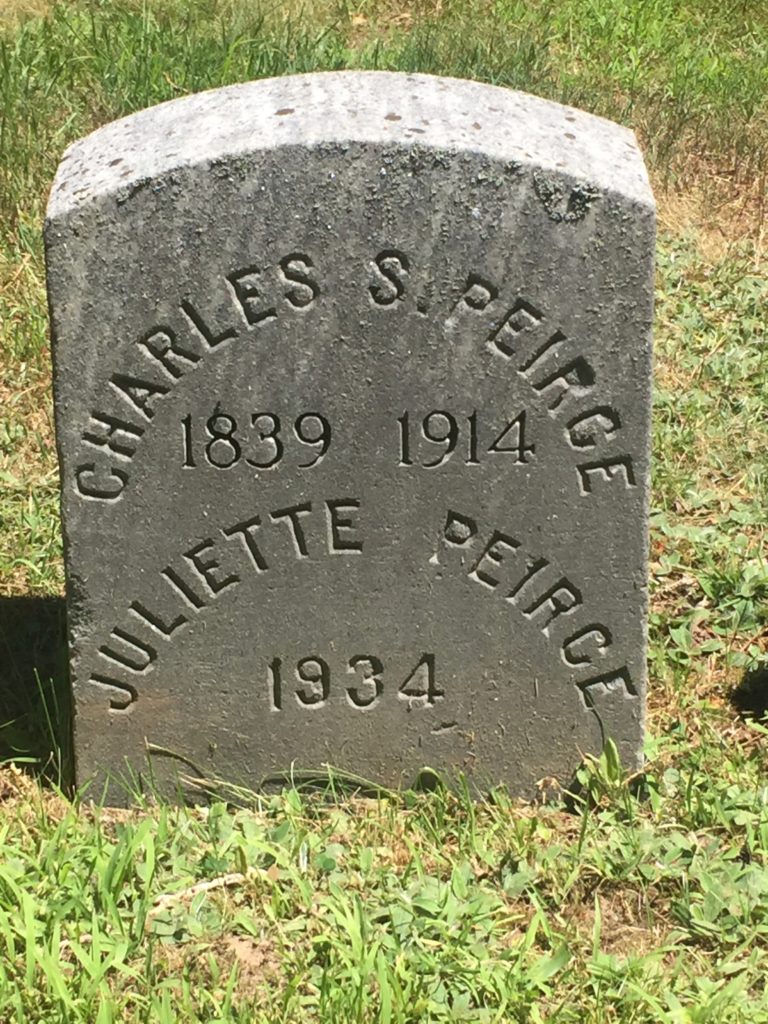Erik Visits an American Grave, Part 631
This is the grave of Charles Peirce.

Born in 1839 in Cambridge, Massachusetts, Peirce grew up in the Harvard elite. His father was an astronomy and mathematics professor there. He went to Harvard himself and graduated in 1862, though a mediocre student. He made a huge enemy in his professor Charles William Eliot, who would later veto the employment at Harvard of this legendary American philosopher when Eliot later became president of the institution.
Peirce started working for the U.S. Coast Survey in 1859, which would provide him off and on employment for over three decades. He got out of the Civil War due to his job with the government. Given that he and his family were sympathizers with treason, that might not have been a bad idea, though it’s not as if said sympathizers didn’t occasionally end up leading Union armies or anything. Yet, he was really racist. For example, much later in life, when he was a famous philosopher, he gave his example as a syllogism about the fallacy of traditional logic.
All Men are equal in their political rights.
Negroes are Men.
Therefore, negroes are equal in political rights to whites.
I don’t want to say this made him exceptionally racist for the 19th century because that’s a very, very, very high bar. But yeah, that’s a deeply racist man.
In any case, he was a promising young scientist, particularly working on understandings of gravity, to the point that the government, a notoriously parsimonious institution in the nineteenth century, sent him to several scientific conferences and to observe natural phenomena such as eclipses in Europe. In some ways, he was an absolutely terrible government employee, such as his unwillingness to finish required reports, some of which took him years to write. But he was deeply interested in questions of logic coming out of his scientific observations, which drove him.
He was rarely a full-time government employee though. In 1879, he became a lecturer in logic at Johns Hopkins University. But he never could get a tenure-track job. Many say this is because he was a really awful person to deal with. He also had a lot of enemies and a scandalous personal life. This consisted of nothing more than I can tell than he lived with a woman for several years before finally bothering to divorce his first wife, but when this was pointed out to Hopkins administrators in 1884, they fired him and he never found academic employment again.
But Peirce also became one of the foundational philosophers of the United States, a pioneer in the ideas of pragmatism. Now, I am not going to try and accurately summarize Peirce’s ideas. He was one of the founders of the idea of semiotics and the philosophy of science, while defining the concept of abductive reasoning. I am the first to admit that I do not have the mind for these big philosophical ideas, which I mostly find a combination of confusing and uninteresting. Call me a bad intellectual if you’d like, I’d happily agree. I could more easily describe what a physicist does as a philosopher such as Peirce. I am just going to link to some discussions. His Wikipedia page is at least a functional overview (I think). The Stanford Encyclopedia of Philosophy goes into far greater detail. You all can flesh this out in the comments.
Despite his philosophical achievements, Peirce lived in true poverty. When his parents died in 1887, they had real money. They were Boston Brahmins after all. So he and his second wife bought a 2,000 acre estate near Milford, Pennsylvania and had the house remodeled to his liking. But they also took on massive debt and made no attempt to live within their means. Debtors followed. Although living in a fancy new house, he lacked the money to pay for heat or even buy paper for his writing, using the backside of whatever he could find. He was even a fugitive hiding from debt collectors in New York City for awhile. Finally, his friends and family paid off his debts, but he lived in poverty anyway. He took on whatever writing work he could get, mostly encyclopedia entries and reviews for journals that didn’t really pay much. Toward the end of his life, his friend and fellow philosopher William James came to the rescue, getting him lecturing gigs at Harvard and even setting up a fund for Boston elite to contribute to in order to get Peirce some money.
Over his life, Peirce is known to have written about 12,000 printed pages and 80,000 handwritten pages of unpublished manuscripts. Because he never held an academic job for long and was a financial mess, it took a very long time for his work to be published in ways that people could access it. Much of his work still has never seen the light of day. His work however has been critical to the ideas behind computing, not to mention his influence among philosophers today.
Peirce died in 1914, at the age of 74.
Charles Peirce is buried in Milford Cemetery, Milford, Pennsylvania.
If you would like this series to visit other American intellectuals, you can donate to cover the required expenses here. Presumably, these other people would have ideas that I can actually follow, but hey, maybe not! Erik Erikson is in Harwich, Massachusetts and Margaret Mead is in Buckingham, Pennsylvania. Previous posts are archived here.


